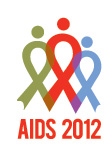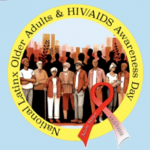 The role violence plays in the ongoing spread of HIV can’t be denied, according to key opinion leaders who addressed delegates at a Monday, July 23, symposium at the XIX International AIDS Conference (AIDS 2012) in Washington, DC.
The role violence plays in the ongoing spread of HIV can’t be denied, according to key opinion leaders who addressed delegates at a Monday, July 23, symposium at the XIX International AIDS Conference (AIDS 2012) in Washington, DC.
The symposium, entitled “Turning the Tide Against Violence,” focused on those who are most affected by gender, youth, police and transgender violence, and the critical need to address this determinant of HIV risk among youth, women, men and transgender populations.
The first speaker Sharmus Outlaw, the co-director of Washington, DC-based Destiny Alliance, opened the discussion with a focus on violence against transgender women and lesbians. Outlaw related recent incidents about a string of murders of transgender women in Washington, DC, and focused on the role of the police in perpetuating a climate of hate and violence against this population group.
Outlaw said police in DC would deliberately put transgender women in harm’s way by harassing them and forcing them into neighborhoods where violence against them was highly likely. She blamed high-risk behavior in this population group on stigma and discrimination.
What’s needed, Outlaw said, is more intense sensitivity training of police so they deal with transgender people with respect, and law enforcement accountability for violence against this group when they should ensure their protection under the law.
The next speaker was HeJin Kim of Gender DynamiX, a lesbian transgender woman and former sex worker who is now an activist and advocate for transgender people’s human rights and lives in South Africa. Gender DynamiX is a human rights organization that promotes freedom of expression and gender identity, and advocates for the rights of transgender and gender non-conforming people.
Kim called attention to the dearth of research on transgender men and women’s high-risk behavior, lack of access to services, likelihood of facing sexual violence and their intersection with other high-risk populations.
According to Kim, transgender people face abusive behavior from almost every social sector, including health service providers who don’t understand transgender issues and their rights. “These issues are what puts transgender people at increased risk because they cannot access services,” Kim said.
One of the HIV risks transgender people face, Kim added, is that they participate in transactional sex or work in the sex industry because of the difficulty many have getting mainstream jobs and living traditional social lifestyles.
To address these transgender issues, Kim said gender-based stigma must be addressed; transgender people’s intersections with other high-risk groups must be understood and resolved; sex work must be decriminalized; and a human rights-based approach to these problems is essential.
HIV and youth activist Cecelia Garcia Ruiz, the gender projects coordinator for Espolea, a Mexican youth-led organization, spoke next about youth violence and HIV.
According to Ruiz, youth violence is increasing globally and this issue is a risk factor for HIV, especially among more vulnerable population groups, such as girls and women, ages 15 to 24, and men who have sex with men.
Ruiz focused on gender-based violence; the rise of school violence; youth violence as a response to young people’s fear of being victimized; victimization of young people by their peers and adults; and the role the community plays as victims of youth violence or observers of this problem. “What’s also a growing concern,” Ruiz said, “is violence among pre-adolescents.”
According to Ruiz, the way community programs respond to this problem may either help or hurt the issue. But interventions should be done early, she said. And young people must be allowed to play a role in violence prevention processes that are acknowledged by adults, Ruiz said.
The final speaker was senior program manager Pavlo Skala, of the International AIDS Alliance in the Ukraine. Skala spoke about consequences of police violence and solutions to the problem.
Skala characterized the police as perpetrators of violence as noted in particular in countries with a large police force. Often police trample on the human rights of vulnerable population groups, such as HIV-positive people, Skala said. In the Ukraine, Skala discussed the police collecting personal information on the HIV states of 6,000 OST patients, their fabrication of crimes against sex workers and criminalization of injection drug users (IDUs) and sex workers. “HIV risk increased in prisons that became a breeding ground for HIV and other diseases,” Skala said.
Skala also discussed corrupt police allying themselves with drug dealers in the Ukraine that led to doctors being persecuted for their rollout of harm-reduction intervention programs for IDUs.
Ways to address these issues, Skala said, is to get legislation passed against criminalization; the establishment of high police standards; outside investigations of police violence; creating strategies to make police accountable in recognizing human rights; and media involvement to focus attention on the issue.
Advertisement
Advertisement
Advertisement






Comments
Comments